This post may contain affiliate links. Please read our disclosure policy.
I wrote this post about how to stop yelling at your kids a few years ago, but I’ve updated it with more ideas and more recent studies, so I wanted to reshare it today…
Did you know that you can stop yelling to get your kids to listen? It’s true. The best part? Your kids will start listening more, start respecting you more, and you’ll feel more connected with your child.
In fact, research in child development proves that yelling causes more discipline issues & more misbehavior in children.
When you stop yelling, your children will start telling you more, talking to you more, and doing what you ask out of respect and understanding, not fear of you losing your temper.
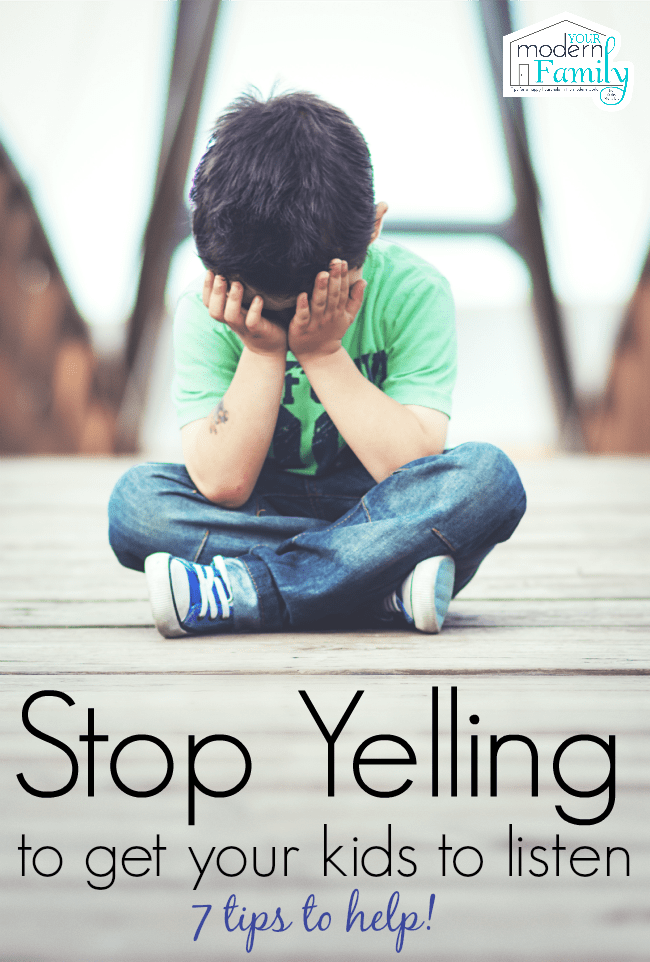
How to stop yelling at your kids – so they’ll listen more:
I know that it can be hard to be the peaceful parent and stay calm in the heat of the moment when your kids aren’t listening – when you are already fed up with whatever else is going on at that exact moment.
When we start to become frustrated and lose patience, even our bodies can sense it. Our blood pressure goes up, our patience goes down, we breathe differently, etc. We need to learn these signs & then take control by taking a deep breath, count to ten, leave the room, etc.
Even more important is that we understand why we are yelling… what made us get to that point.
Yelling Usually Occurs Due To An Underlying Issue
Toys being left out? Shoes on in the house? Repeatedly asking them to clean their rooms? Perhaps you are stressed about work, worried about a phone call, feeling under pressure to clean the house before visitors arrive, have lost track of time and you are running late, etc…
Whatever the reason for your worry or stress at the time, the kids end up pushing parents over their limit and the yelling begins. If you really want to know how to stop yelling at your kids, you need to find the source.
Oftentimes, we find that the real source of our yelling comes from us. We are unprepared, we are stressed, we are busy, and feel overwhelmed. With all of that being said, it is possible to go from stressed parent to relaxed parent.
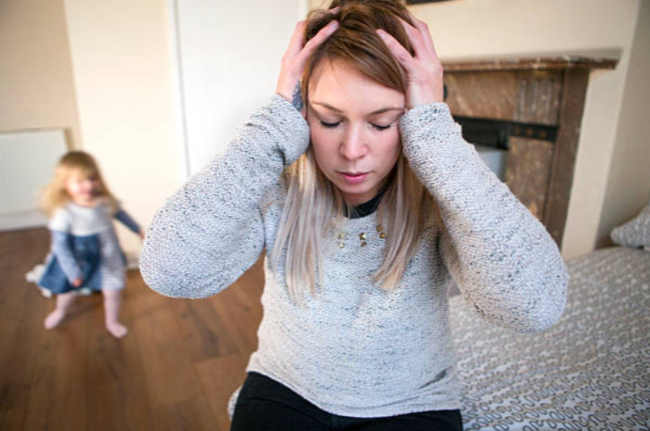
The stress manifests and comes out in the form of a raised voice at the people we love.
Many times, yelling can be prevented by getting to the root of the issue & making changes: Maybe prepping dinner in the mornings would lower the stress in the evenings? Maybe putting everything in the car before you go to bed at night would help everyone get out quicker in the mornings?
Whatever it is, there is often a short window time before the yelling begins, when the frustration starts to worsen. Once parents are able to pay attention to those signs, they can better control the situation without yelling, which also means without leaving you feeling guilty and your child feeling discouraged.
Studies Show 98% Of Parents Have Yelled
Almost all parents yell or have yelled. In fact, a study found that 90% of parents yelled in the past 12 months by the time that their child was two years old.
That percentage rises to 98% of parents who had yelled or used one or more forms of psychological aggression during the past year by the time that the child is five years old.
If you feel like you yell more than you want to, remember that you are not alone.
We lose our temper from time to time. Parents yell. Kids yell. People yell. We all lose our tempers in the heat of the moment. We are human, after all.
The good news is that tomorrow is a new day. You can learn how to stop yelling at your kids & you can put it into play immediately.
Studies Show That Yelling Causes MORE Discipline Issues & Misbehavior
There are reasons that doctors, parenting experts, etc. say that yelling isn’t effective. A study completed by the University of Pittsburgh & the University of Michigan looked at yelling during the teenage years and how it impacted a child’s behavior.
They surveyed, questioned, and studied teenagers and their parents.
Middle Schoolers are more likely to be depressed if parents yell.
The participants of the study were 976 adolescents involved in the study. They were 13-14-year-old, middle-school students (imagine your 13 year old son or daughter). They were chosen from ten different schools in PA. The children all lived with two parents.
The children were studied and questioned for the first time in 7th grade, and again a year later in 8th grade.
The study found that the higher the level of harsh verbal discipline, yelling, or insults had been given by the parents (mom or dad) at the age of 13, the more likely the child would have conduct problems and depression by the age of 14, one year later.
Parenting a teenage son or being the parent of a teen daughter isn’t easy, by any means, but it is such an important time in their lives, as they are learning to become more like adults and less like children. They depend on us to talk to them, teach them, and model for them what this looks like – and yelling isn’t what we want them to learn.
Research proves the negative effect of yelling plays a bigger role than a feeling of being loved.
Studies also found that even when a child felt loved and supported by their parents, the negative effect of the harsh words and yelling played a bigger role. This means that our kids remember our harsh words more than the good stuff. It proves the point that our words become our child’s inner voice.
The harsh words that we say, out of anger or frustration, leave more of an impact on the children than the positive words that we say. The outcome of the study was that the effect of the verbal discipline was just as strong as if the child had not been loved consistently by their parents.
The reason was that the words, like lazy or other names, or harsh tones (yelling) from the parents often left children feeling worthless, not good enough, and insecure. These feelings leave a long term impression on children.
When answering the question of how to stop yelling at your kids – they found that positive parenting played a big role.
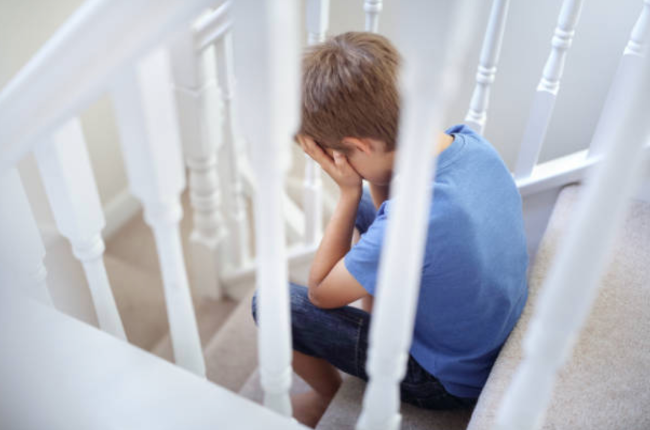
How to stop yelling at your kids with Positive Parenting.
Studies Show Using Positive Parenting Yields Better Outcomes. Studies consistently show that using positive discipline is better for both parents and children. Children are better behaved, have better mental health, a more positive view of life and themselves, have higher grades in school, perform better academically, and are happier overall than kids being physically or verbally punished.
What is Positive Parenting?
“Positive Parenting is focused on developing a strong, deeply committed relationship between parent and child based on communication and mutual respect. It focuses on teaching children not just what but also why. Positive parenting means training children toward self-control.” – Barbara Harvey
Parenting in this way allows you to focus on mutual respect and learning for the future, instead of punishing immediately (resorting to punishment). It focuses on finding out how to stop yelling at your kids by figuring out WHY you yell – then finding alternative ways (like walking away until you are calm and then talking to your kids when you are ready).
Examples of Positive Parenting:
When I am trying to explain it, here are some key points that I share (from my own views):
- Instead of yelling & immediately punishing (without a thorough explanation) I have a conversation with our kids about the issue at hand. I do this because I want our kids to do the right thing because it is the right thing to do… not because they are scared of us. I want them to do it all of the time, not only when they are afraid of being caught. I’m parenting for the long-term outcome, not the short term one.
- I want them to obey the rules because they want to and because they know that I expect it, but not because they are fearful of being caught.
- I don’t want them to only follow the rules because they are afraid of me, or what will happen when I am not around? What will happen as they grow older and are on their own?
- I want to raise them to WANT to do the right thing because they know that they should.
- We offer respect by listening to our kids, and in return, we are given respect because our children feel heard.
When I was a teacher, I never yelled at my students (I wouldn’t have dreamt of it, honestly!) I didn’t have to yell. They were respectful and kind.
Why were my students’ good listeners, when I never raised my voice?
It’s actually more simple than it seems: Rules were set in place from Day One and they knew the rules. If they broke a rule, they lost a privilege.
I didn’t have to punish them… they were in charge of their own choices. They knew that if they broke the rule, they were choosing to give up their privilege.
The same principle stands in the ‘regular’ world. If our kids break a rule, they lose a privilege – maybe electronics or a play date. I don’t need to yell at them, because there isn’t anything to yell about.
There were no ifs, and, or buts about it.
Rule Broken = Privilege Lost
I reminded my students, daily, that THEY are in control of themselves. As the teacher, I’m the person that is there to teach them, support them, and encourage them.
I’m there to enforce the rules, but they decide if they want to follow the rules or not. They decide if they want to be rewarded for following the rules or face the consequences by breaking the rules.
I don’t want to be the JUDGE, I want to be the GUARD.
Think of it as a courtroom and you are the one enforcing the law, but not making the judgment call:
How I explained it & set up the system in my classroom:
In the first school that I ever taught in, we had this idea of asking our first-grade students for input.
My students told me about which privilege would be lost (from doing the wrong thing), which rewards were gained (from doing the right thing), when those things would take effect, etc… They just had a “say” in how things were laid out.
This lets them have a true part in decision making, so when they did something (good or not good) they knew the outcome because they had helped to create it.
It gave them a sense of ownership.
We were able to keep it up and continue to let them have a feeling of “being in control of themselves” by doing the following things:
- We worked on their Growth Mindset.
- My students kept a notebook with their grades, their daily progress, their goals, and more. They used their notebook daily. They would fill in the graph for how well they did.
Example: We had a bar graph for spelling tests. Every test, they would take out their graph and color in the number of words that they spelled correctly. - Every week, they would go back in and see how they were doing compared to the previous weeks and compared to their goals. Did they progress or regress? Did they reach their goals? How can they improve?
- They kept track of their behavior every day, their homework, etc… (I also kept track, but this particular notebook was for them.)
If you want to know how to stop yelling at your kids, get them involved.
It works at HOME, too.
The idea is to let them take ownership is a real way to help them achieve success and desire to do so. You aren’t yelling – you are letting your child take part in what happens and the consequences speak for themselves.
You are showing them that they make the choices that impact their lives.
They can choose to follow the rules or face the consequences.
TIP: All of these suggestions that I’m giving today work if you are consistent. As with anything, consistency is key.
Why Does Yelling NOT Work?
Yelling stems from the loss of control. It happens to most of us at some point.
Yelling stems from irritation and frustration.
Talking to your kids, in a calm manner, will get you SO much further than yelling. It will let you have a relationship with a “back and forth” conversation.
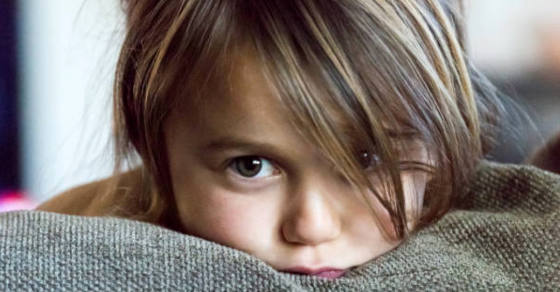
How To Get Children To Listen WITHOUT Yelling
When the feeling to yell arises in you, try one of these alternatives (it’ll stop you from yelling at your kids.)
1- Remember that if you yell- they will yell. “Monkey see… Monkey do.”
If you want to see your child lose control in frustrating situations, you just have to do it yourself. In order to learn how to stop yelling at your kids so they won’t immediately resort to yelling when they get mad, you have to model the behavior that you want to see.
If you want to see your child remain calm and collected and face a problem like an adult- you have to do it.
2. Whisper to get their attention.
I know this sounds crazy, but it works. As a teacher, I used this approach often and it always got their attention. When the kids would become too loud, I didn’t want to yell over their voices, so I would whisper.
I do this as a parent, as well, with our own children. Whispering makes them stop to see what you are saying. It also has a calming effect on the children, so it’s a win-win
3- Let their natural consequences speak for themselves.
If a toy is lost or broken because it was left out, don’t replace it. If they don’t get to go outside because they didn’t do chores, don’t “give in”.
Remember- the rules are made and you don’t have to bend them. Don’t even let anyone know that this CAN be done.
One time, we ate in a different room of the house and our son asked me “Mom- are you sure we can do this? I don’t think we should be eating in this room.”
They had no idea that I set the rule up in the first place because it was just never questioned.
They Are Children
4- They are children.
Remember this and then remember it again. They are children.
Try to remember back to when you were a child. Our decisions as a child are not always good ones and we need to use all of these moments as teachable moments. Want to know how to stop yelling at your kids? Remember that they ARE only kids.
5- Don’t worry about “The Jones’.”
I see and hear parents all of the time that will say “I just wish that I was more like ___” but you need to remember that everyone has their struggles. No one’s life is as perfect as they show on Facebook. Seriously. We all lose our tempers at some point (which brings us to #6)
6- Just say “I’m Sorry”
If I feel like I stepped out of line and the punishment didn’t fit the crime (example: Lose electronics for a week because they didn’t make their bed today) I will just say: “I’m sorry. I went overboard today and I shouldn’t have yelled like that. After thinking it over, I’ve decided that two days is plenty, but you also have to do an extra chore today to make up for the one that I had to do for you.”
7- Talk TO your child, not AT your child.
As I was stating above, the best thing that you can do for your child is to sit down and talk to them. It makes such a huge difference as your child grows. We spending time talking, one-on-one, every single night.
I think you’ll find that once you start this routine of talking one-on-one with your child, it’ll be your favorite part of the day (and theirs, too).
Things that you can say to your child to remind them of their actions, and encourage them to come up with a resolution, without yelling .
- “The way that you are acting is making me really sad.”
- “I just don’t understand why you would do that when you know that it isn’t right. That’s not who you are.”
- “What should I do about it if this happens again? We need to have a consequence in place because I can not tolerate this behavior. I’m sure it won’t happen again, but we need to figure out what will happen if it does.”
- “Do you think I should have you write an apology note to your brother?”
- “You need to think of a way to apologize to your sister.” (brainstorm ideas with them.. “Maybe you should do one of your sister’s chores?”)
- “I always think of you as being such a kind person, and I’m so sad right now to know that you intentionally hurt his feelings.”
- “Why are you acting this way? Is something going on that you aren’t telling me? This is so unlike you.”
- “I need you to work harder at controlling yourself. You are not a mean or rude person, so I don’t want you to give in to temptation when it sneaks in. I know that you are kind and loving, so let that side of you show more so others get to see the wonderful child that I see every day” . (←Play up their good-side, put emphasis on their positive attributes. Let them strive to become what they think you expect of them! They will not want to let you down.)
How to stop yelling at your kids:
Give yourself time and chances to practice patience by finding opportunities to be patient. Patience is a virtue. Patience is the ability to wait while keeping a good attitude about it – in this case, not yelling. We develop this through practice – everything from waiting our turn in card games, to resisting the urge to yell until we’ve had a chance to calm down.
While we know all of this, we also need to remember that we will lose our temper and patience at some point. We will probably raise our voices at one time or another. We are human and we are not perfect.
Everyone yells. We are human. Give Yourself Grace
Yelling is not a TERRIBLE thing, so don’t feel too bad right now if you are reading this and thinking: “Oh no. I yelled today.”
We are not perfect – we all lose our tempers and yell.
I need our kids to understand that I am going to yell from time to time.
Their dad will yell. Their grandparents, aunts, uncles, siblings, friends…. are all going to yell.
It’s OK that they know this and it’s ok that they see it happening because one day their coach, teacher, boss, or another authority figure will yell. It’s going to happen and when it does I don’t want it to make them too scared or nervous.
In the end, I want my children to be patient and kind, so I aim to be patient and kind, too.
I will be the best example of love for my children. I set an example of the kind of people I want them to be on a daily basis. Even if I don’t realize it… they are watching, listening, and learning from us every single day.
All that we can do, as parents, is to try our best to be our best, so our kids can do the same.
As my mom says: “When you know better… you do better.”
You are welcome to sign up for my FREE e-mail series on spending more time with your children. In the meantime, I’ll send you a 30-day Printable Calendar filled with one on one time ideas for your kids (and a separate one for teenagers)
.

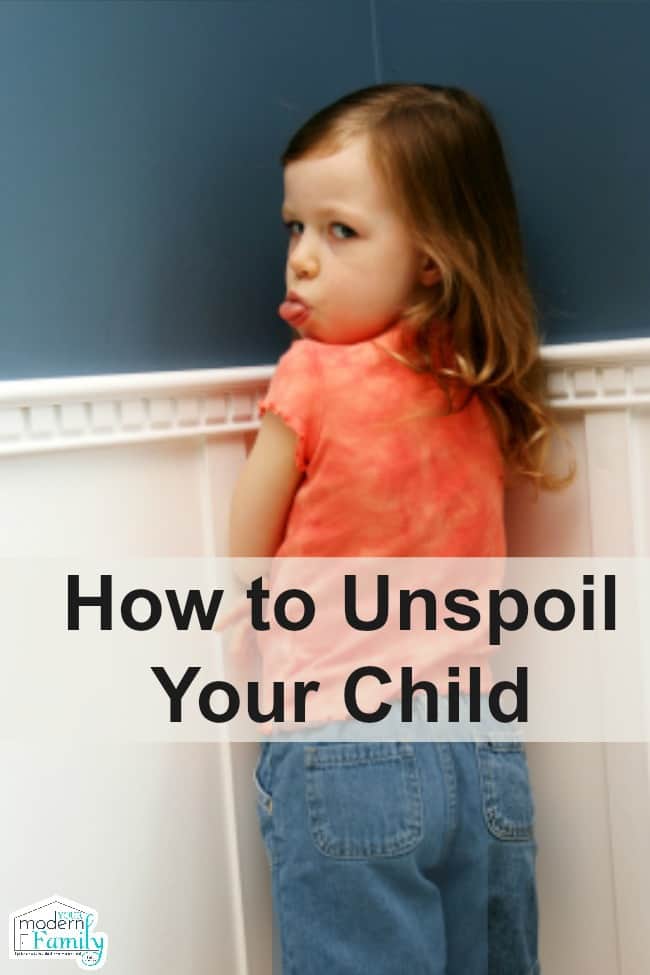
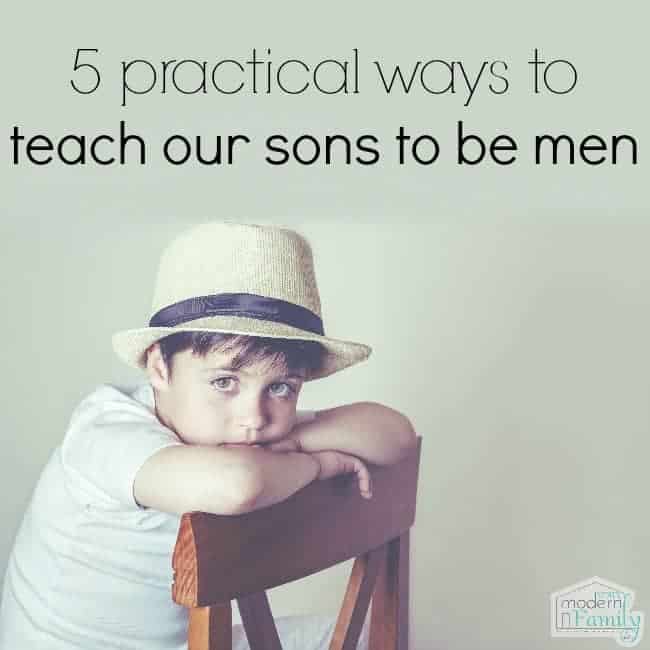
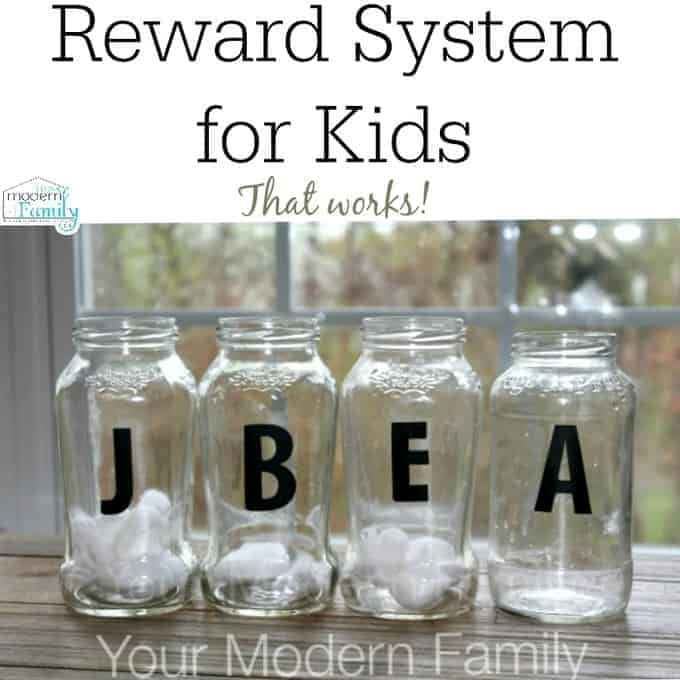
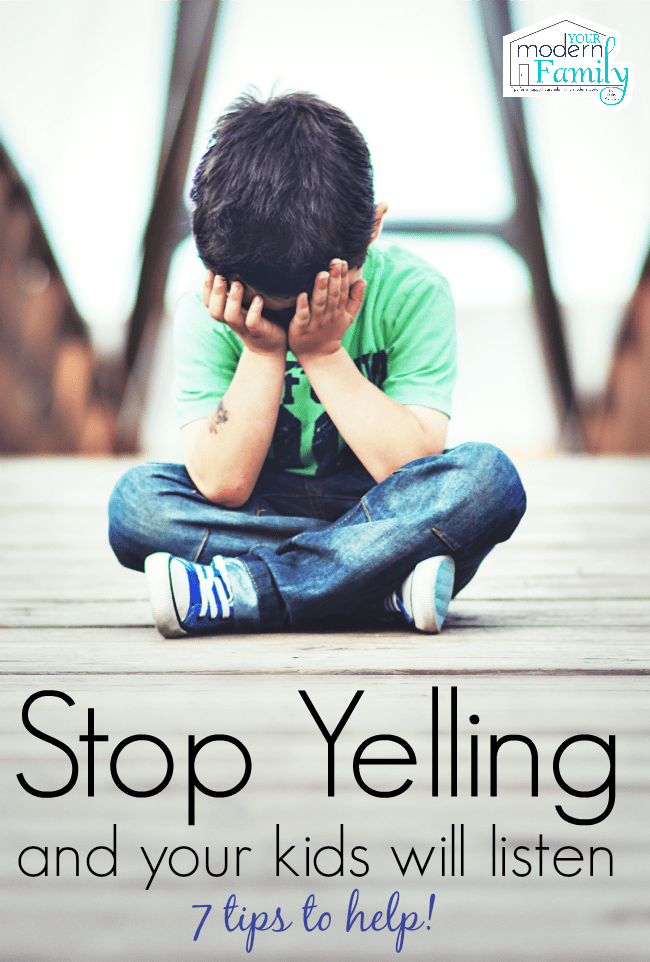




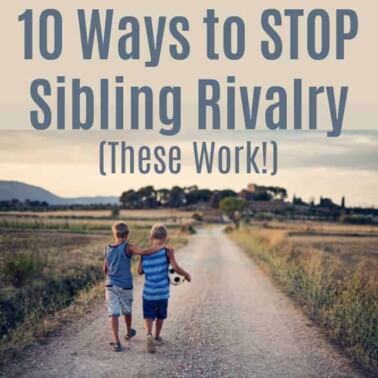









I wouldn’t deny the fact that at some point in time, I yelled at my kids, but with this advice I will stop doing that, I want the best for my kids and yelling at them is absolutely not one of the best for them. Thanks.
Thanks alot for this article. I really needed to read this to remind myself. It’s just so hard being a mother and staying sane. I always want to be that calm mum but it’s so so hard when they just don’t listen. From what age does these tips apply. How would it work for my 2.5 year old who has suddenly become difficult overnight.? I used to be able to talk to her and explain to her why she can’t have or do something she wants. Used to work before but now she just yells Nooo.
Hi Wajeeda,
My two biggest suggestions are:
1- Be consistent
2- Offer a lot of one-on-one time without distractions. I’m always amazed at what a little one-on-one time does to any behavior problems.
Is there a printout I can get of this post?
Thank you